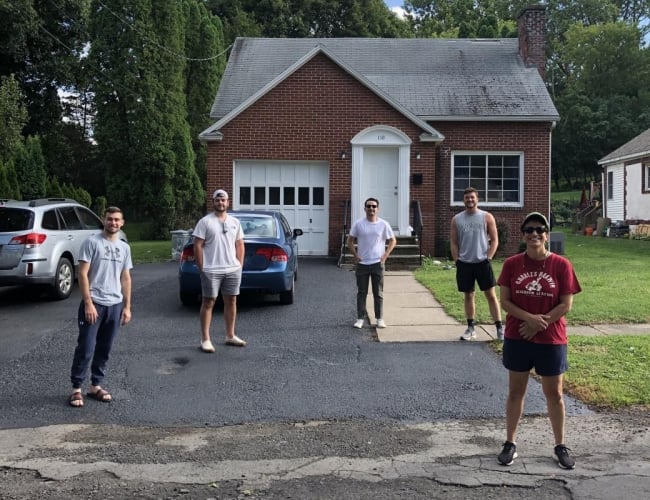You have /5 articles left.
Sign up for a free account or log in.

Linda LeMura meets with students living near campus.
Courtesy of Le Moyne College
Twice a day, every day, Linda LeMura walks through a neighborhood near a college campus in Syracuse, N.Y. She knocks on the door of every student residence to ask how the semester is going so far and to ensure that students are following the college’s new COVID-19 precautions.
LeMura is the president of Le Moyne College, a Jesuit institution in Syracuse. She's also the students' neighbor. She moved into a house near campus owned by the Jesuit novitiate and plans to live there at least through midterms, if not the entire semester.
“I was going to do everything humanly possible … to ensure that our students, particularly off campus, would do what they needed to do to keep the infection rate low,” LeMura said.
She described some of the student houses as “spirited” -- others confirmed that several regularly threw parties in the past. But after one weekend on campus this year, the neighborhood has been relatively quiet.
“I haven’t started to annoy them just yet, but I know I could be dangerously close,” LeMura said. “Some days, I go with a bag of cookies. The provost and I walked around the neighborhood and left cookies with notes inside to remind them about weekend events and how they need to maintain certain behaviors. And, you know, by and large, the activities off campus have been very different. It's quiet. They understand the social distance, distancing and masking-up requirements. They’re following the rules.”
Jason Luscier, an associate professor of biology at Le Moyne, lives a few houses away from LeMura. He agrees that students have so far kept things low-key.
“It sure seems to have quieted things down,” Luscier said. “I think the students on this campus love Linda. She’s such a positive energy force, and I think having her in the neighborhood generally makes them feel good.”
Molly Coolican, a junior at Le Moyne, echoed Luscier's comments.
“I walk out in the morning just to go to my car to go to class, and she’s like, ‘Good morning, how are you doing’ anytime I see her,” Coolican said. “I think her efforts combined with other administrators and even the student leaders on campus has just been so influential, because we really know the consequences.”
Le Moyne College welcomed students back at the end of August for a hybrid online and in-person semester. Some students, including those in Luscier’s ecology class, meet for in-person lectures and labs.
Luscier said the forced shift in instruction modes was a welcome challenge.
“Certainly COVID-19 is terrible -- I mean, who wants it -- but the way that it’s made me rethink the structure of my class, the way that I approach the topic, the way that it’s made me rethink all of that has been super rewarding,” he said.
He has always taught his ecology labs outdoors, but this semester he’s brought lectures outside, too. Students attend class in masks and practice social distancing, but the added benefit of being outside relaxes everybody a bit, he said.
The college sent test kits home to students and identified two cases of COVID-19. Those students quarantined at home before they traveled. After students arrived on campus, they were tested again, and the college will continue to test students about every other week, in addition to random surveillance testing of those living in residence halls, those on athletic teams and other student groups.
Nonetheless, some students have still tested positive for COVID-19 on campus. As of Friday, the college had identified four cases, three of which were still active. In one case, contact tracing led to a quarantine of the women’s softball team.
LeMura and Luscier agree that so far, reopening has gone well. But students had only been back for one weekend, Luscier noted.
“We’ll see how this second weekend goes,” he said Friday.
Le Moyne is paying for students’ tests. It also spent $250,000 on an app called Emocha, which allows students, faculty and staff members to log and share their symptoms and other information. In total, COVID-19 preparations will cost the college millions.
“So far, we’re over 2 million dollars,” LeMura said. “But that $2 million is a growing number. At the end of the semester, it will be significantly higher.”
All of the funding for testing, personal protective equipment and other precautions is coming from the college’s operating budget. In recent years, the college has reported about $85 million in operating expenses.
“Obviously, resources are tight because we had to give back room and board dollars in March,” LeMura said. “But we had to make space for these provisions in order to get the green light from both the local health department and the New York State health department.”
Coolican mentioned that students are well aware of the financial pressures on the college.
“If we close, there would be a lot of people who lost their jobs and took pay cuts, so it’s really not just our experience at Le Moyne,” she said. “We all know that if we can just lay low this semester and follow the rules, eventually there will be better days ahead.”




